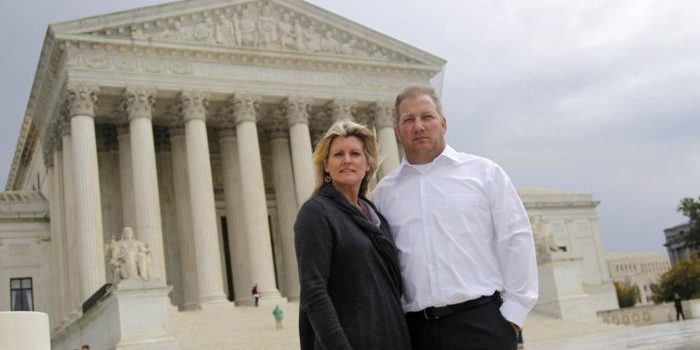(Mark Pellin, Headline USA) The U.S. Supreme Court in a unanimous ruling Thursday slapped down the Biden administration’s overreaching EPA edicts defining what “waters of the United States” the government can police, often in opposition to private property rights.
The Biden administration had previously repealed a Trump-era rule and vastly expanded the federal government’s regulatory reach.
The case centered around two Idaho residents’ claim that the EPA wrongly prohibited them from building a home near an area of wetland under the Clean Waters Act of 1972, which gave the federal government control over “waters of the United States” — often called WOTUS — that included rivers and lakes.
The high court’s decision put the brakes on the overreach, ruling in favor of Michael and Chantell Sackett.
“We hold that the CWA extends to only those wetlands that are as a practical matter indistinguishable from waters of the United States,” Justice Samual Alito wrote in the court’s ruling, which was hailed as a victory for property rights and a rebuke of the Biden EPA.
“For far too long, the Biden Administration has weaponized WOTUS to expand federal jurisdiction over dry creek beds and mud puddles across the United States,” said Rep. Matt Rosendale, R-Mont. “In a major victory for Montana farmers and ranchers, the Supreme Court ruled against this unconstitutional overreach and reaffirmed the rights of private property owners.”
West Virginia AG Patrick Morrisey echoed that sentiment and called Thursday’s ruling a “big win.”
“My office led a 26 state amicus effort in support of a more accurate definition of the ‘waters of the United States,'” Morrisey wrote. “Earlier this year, in a separate case, we obtained a preliminary injunction of the new Biden Administration WOTUS policy.”
South Dakota Republican Gov. Kristi Noem called the court’s decision “fantastic news for farmers and for Freedom!”
To say this is a BIG win for farmers in Tennessee and the United States is an understatement. Extremely thankful the Supreme Court reaffirmed the Clean Water Act, and hopefully this is a step in ensuring farmers have much needed clarity.#TNFarmBureau | #WOTUS https://t.co/RAe7PH7xnH
— Tennessee Farm Bureau Federation (@TNFarmBureau) May 25, 2023
EPA chief Michael Regan, last seen floundering in cesspools of contaminated water from the disastrous East Palestine, Ohio, toxic train derailment that the Biden regime largely ignored, panned the SCOTUS/WOTUS ruling.
“I am disappointed by today’s Supreme Court decision that erodes longstanding clean water protections,” he said in a statement.
🚨The Supreme Court just delivered a huge victory for Illinois farmers by ruling against Biden's unconstitutional WOTUS power grab! The Supreme Court stopped Biden from weaponizing the EPA to go after farmland with their "Waters of the United States" rule.
— Rep. Mary Miller (@RepMaryMiller) May 25, 2023
While the court’s decision was unanimous in ruling that the Sacketts’ property was not covered by the CWA, only five justices agreed with the scope of definitions for determining federal reach. A concurring opinion penned by Justice Brett Kavanaugh, and joined by the court’s three leftist justices, claimed that the law covered wetlands that were separated from major waterways only by a dike or dune beach.
Attorneys representing the Sacketts said the high court reached the correct decision where it mattered most.
“The court’s ruling returns the scope of the Clean Water Act to its original and proper limits,” said Damien Schiff, attorney for the Pacific Legal Foundation.
“Courts now have a clear measuring stick for fairness and consistency by federal regulators. Today’s ruling is a profound win for property rights and the constitutional separation of powers.”

